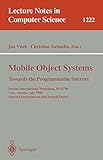Mobile Object Systems Towards the Programmable Internet [electronic resource] : Second International Workshop, MOS'96, Linz, Austria, July 8 - 9, 1996, Selected Presentations and Invited Papers /
Material type: TextSeries: Lecture Notes in Computer Science ; 1222Publisher: Berlin, Heidelberg : Springer Berlin Heidelberg : Imprint: Springer, 1997Edition: 1st ed. 1997Description: X, 326 p. online resourceContent type:
TextSeries: Lecture Notes in Computer Science ; 1222Publisher: Berlin, Heidelberg : Springer Berlin Heidelberg : Imprint: Springer, 1997Edition: 1st ed. 1997Description: X, 326 p. online resourceContent type: - text
- computer
- online resource
- 9783540687054
- 004 23
- QA75.5-76.95
Mobile computation -- Objectworld -- Commentary on “Objectworld” -- Mobile agents: Are they a good idea? -- Mobile agents: Are they a good idea? — update -- A note on distributed computing -- Afterword -- Instruction-based communications -- Analyzing mobile code languages -- Sumatra: A language for resource-aware mobile programs -- Migratory applications -- The messenger environment MØ — A condensed description -- Mobility and persistence -- Security and communication in mobile object systems -- Safe and secure execution mechanisms for mobile objects -- Jada: Coordination and communication for Java agents -- Performance-oriented implementation strategies for a mobile agent language -- Dynamic linking for mobile programs -- Adaptive compression of syntax trees and iterative dynamic code optimization: Two basic technologies for mobile object systems -- A type-based implementation of a language with distributed scope -- Interaction of java and telescript agents.
If the Internet is seen as a single, vast, programmable machine, what is the proper programming paradigm to facilitate development of the new applications it must offer? This state-of-the-art survey deals with this question. The situation we face is similar to that in the 1960s, when a new hardware/software architecture was introduced and it took some time for the programming-language and operating-system specialists to come up with the proper programming paradigms. Now we have the new and exciting paradigm of mobile computing, where computations are not bound to single locations but may move around at will to best use the available computer network resources. This paradigm will have a profound impact on the way distributed applications, in particular Internet applications, are designed and implemented.


There are no comments on this title.